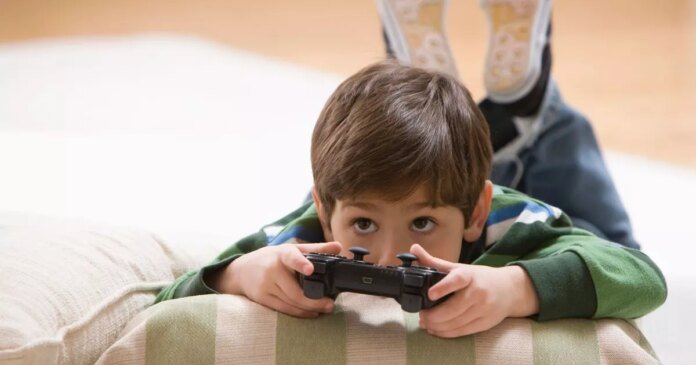While screen time has become a huge part of life for most families, one mum decided to ban her son from gaming TV and phones altogether – and quickly noticed a drastic change in his behaviour.
Lauren, a mum-of-four, is a TikTok creator who shares snippets of her life on the app. In a recent video, she revealed that she and her husband had decided to put their eight-year-old son, Oscar, on a gaming detox after becoming concerned about his screen time.
“It has now been three weeks since Oscar has not been gaming, to have no telly and no YouTube, and I’d say the first week was the hardest,” she said at the start of the video. “He was actually crosser than usual, and we felt that his behaviour actually got worse. But then the following two weeks after that, there has been a massive, positive change.”
She explained she noticed Oscar’s behaviour in general had improved, as well as his focus and mood. “He no longer seems to be in a massive rush, he’s able to just enjoy the pace of life, I’d say,” Lauren said, saying Oscar had been spending more time playing outside with his friends and enjoying ‘simple childhood games’, taking daytime baths, and reading more.
Lauren continued to say that Oscar also wanted to cook more and help her out around the house. She explained: “And just wanting to spend time, be more present and be more engaged in everything.
“Even in the winter months when we’re not naturally drawn to being outdoors, we’ve noticed we’re not trying to fill every weekend with activities just to replace the tech time this time around and actually that’s been the best thing because Oz is just learning to be,” she said. “To be in his home, to figure out how to enjoy his time without screens and just to find joy in every day moments.”
This wasn’t the first time they’d limited Oscar’s screen time. A few years ago they banned gaming and YouTube in their home after claiming the pastimes affected his behaviour negatively.
“His patience, especially with his little sister Ocean, had worn thin and he’d become quite erratic, constantly thinking about gaming, rushing through meals just to get back to it, and waking up asking for it, even though he’s only allowed it on the weekends,” Lauren shared.
“And even this time around it has been another learning curve for us parents. Every stage brings new challenges, but also new insights. And so far, so good.”
Other parents took to the comment section to share their own experiences of putting their children on similar gaming and screen bans.
One person said: “Doing the same with my 8.y.o. I’d noticed a shift I’ve never seen before in her. All conversations are about gaming. First to the last thing she did was grab her tablet to the point where she was unable to sleep unless youtube was playing in the background… first week has been tooooough! constant tantrums and begging me to let her watch youtube.”
Another shared: “You’re doing the right thing, my brother is 20 now and let me just say, the aggression from gaming doesn’t stop with age. He still screams at video games. Always has.”
However, not everyone believed the ban was a good idea, as another use wrote: “I was a gamer all throughout childhood and now into adulthood. There’s nothing wrong with gaming, I never had bad behavior or anything. The issue is teaching him emotional regulation.”
“I do limit screens but getting rid of games completely seems like just avoiding the problem. he’ll go back to gaming one day, still not able to control those emotions. teaching him now how to get,” another user said.
At Reach and across our entities we and our partners use information collected through cookies and other identifiers from your device to improve experience on our site, analyse how it is used and to show personalised advertising. You can opt out of the sale or sharing of your data, at any time clicking the “Do Not Sell or Share my Data” button at the bottom of the webpage. Please note that your preferences are browser specific. Use of our website and any of our services represents your acceptance of the use of cookies and consent to the practices described in our Privacy Notice and Cookie Notice.














